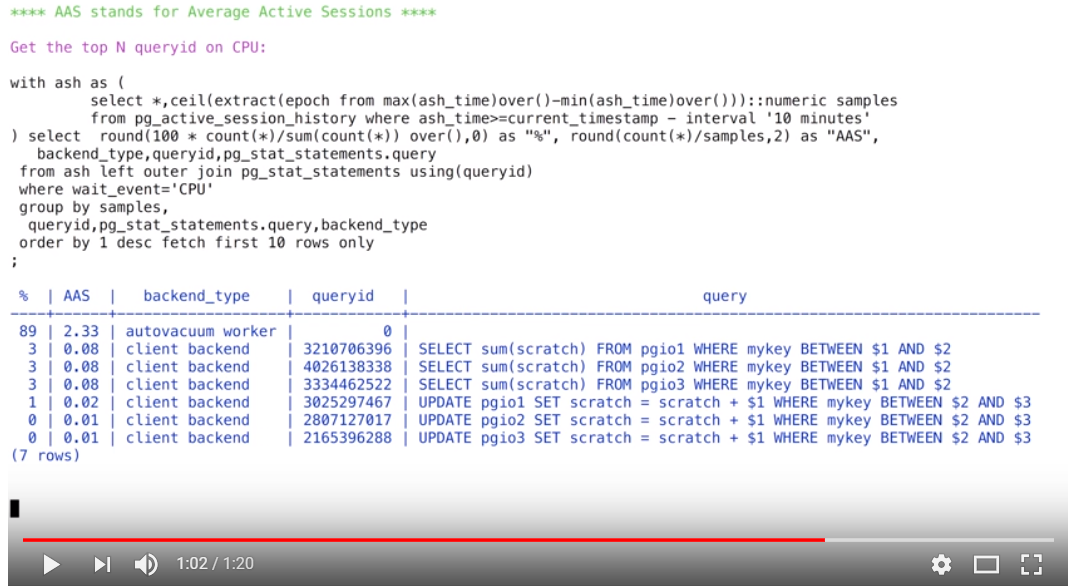PostgreSQL provides session activity. However, in order to gather activity
behavior, users have to sample the pg_stat_activity view multiple times.
pgsentinel is an extension to record active session history and link
the activity with query statistics (pg_stat_statements).
The module must be loaded by adding pgsentinel to
shared_preload_libraries in postgresql.conf, which means a server restart
is needed.
When pgsentinel is enabled, it collects the history of session activity:
- It's implemented as an in-memory ring buffer where samples are written with a given (configurable) period. Therefore, the user can see some number of recent samples depending on the history size (configurable).
In combination with pg_stat_statements, this extension can link the session activity with
query statistics.
To get more granular queries statistics, pgsentinel samples the pg_stat_statements view:
- at the same time it is sampling the active sessions
- only for the queryid associated to an active session (if any) during the sampling
pgsentinel launches a special background worker for gathering session activities.
pgsentinel is implemented as an extension and not available in the default
PostgreSQL installation. It is available from
github
under the same license as
PostgreSQL License
and supports PostgreSQL 9.6+.
pgsentinel is a PostgreSQL extension which requires PostgreSQL 9.6 or
higher. Before the build and install steps, you should ensure the following:
- PostgreSQL version is 9.6 or higher.
- You have the development package of PostgreSQL installed or you built PostgreSQL from source.
- Your
PATHvariable configuration includespg_config, or you've set a value forPG_CONFIG.
The typical installation procedure may look like:
As pgsentinel uses the pg_stat_statements extension (officially bundled with PostgreSQL) for tracking which queries get executed in your database, add the following entries to your postgres.conf:
$ shared_preload_libraries = 'pg_stat_statements,pgsentinel'
$ # Increase the max size of the query strings Postgres records
$ track_activity_query_size = 2048
$ # Track statements generated by stored procedures as well
$ pg_stat_statements.track = all
restart the postgresql daemon and create the extension:
$ git clone https://github.com/pgsentinel/pgsentinel.git
$ cd pgsentinel/src
$ make
$ sudo make install
$ psql DB -c "CREATE EXTENSION pgsentinel;"
pgsentinel reports the active session history activity through the pg_active_session_history view:
| Column | Type | Collation | Nullable | Default |
|---|---|---|---|---|
| ash_time | timestamp with time zone | |||
| datid | oid | |||
| datname | text | |||
| pid | integer | |||
| leader_pid | integer | |||
| usesysid | oid | |||
| usename | text | |||
| application_name | text | |||
| client_addr | text | |||
| client_hostname | text | |||
| client_port | integer | |||
| backend_start | timestamp with time zone | |||
| xact_start | timestamp with time zone | |||
| query_start | timestamp with time zone | |||
| state_change | timestamp with time zone | |||
| wait_event_type | text | |||
| wait_event | text | |||
| state | text | |||
| backend_xid | xid | |||
| backend_xmin | xid | |||
| top_level_query | text | |||
| query | text | |||
| cmdtype | text | |||
| queryid | bigint | |||
| backend_type | text | |||
| blockers | integer | |||
| blockerpid | integer | |||
| blocker_state | text |
You can see it as samplings of pg_stat_activity providing more information:
ash_time: the sampling timetop_level_query: the top level statement (in case PL/pgSQL is used)query: the statement being executed (not normalised, as it is inpg_stat_statements, which means you see parameter values)cmdtype: the statement type (SELECT,UPDATE,INSERT,DELETE,UTILITY,UNKNOWN,NOTHING)queryid: the queryid of the statement which links to pg_stat_statementsblockers: the number of blockersblockerpid: the pid of the blocker (if blockers = 1), the pid of one blocker (if blockers > 1)blocker_state: state of the blocker (state of the blockerpid)
pgsentinel also reports query statistics history through the pg_stat_statements_history view:
| Column | Type | Collation | Nullable | Default |
|---|---|---|---|---|
| ash_time | timestamp with time zone | |||
| userid | oid | |||
| dbid | oid | |||
| queryid | bigint | |||
| calls | bigint | |||
| total_exec_time | double precision | |||
| rows | bigint | |||
| shared_blks_hit | bigint | |||
| shared_blks_read | bigint | |||
| shared_blks_dirtied | bigint | |||
| shared_blks_written | bigint | |||
| local_blks_hit | bigint | |||
| local_blks_read | bigint | |||
| local_blks_dirtied | bigint | |||
| local_blks_written | bigint | |||
| temp_blks_read | bigint | |||
| temp_blks_written | bigint | |||
| blk_read_time | double precision | |||
| blk_write_time | double precision | |||
| plans | bigint | |||
| total_plan_time | double precision | |||
| wal_records | bigint | |||
| wal_fpi | bigint | |||
| wal_bytes | numeric |
The field descriptions are the same as for pg_stat_statements (except for the ash_time one, which is the time of the active session history sampling).
The worker is controlled by the following GUCs:
| Parameter name | Data type | Description | Default value | Min value |
|---|---|---|---|---|
| pgsentinel_ash.sampling_period | int4 | Period for history sampling in seconds | 1 | 1 |
| pgsentinel_ash.max_entries | int4 | Size of pg_active_session_history in-memory ring buffer | 1000 | 1000 |
| pgsentinel.db_name | char | database the worker should connect to | postgres | |
| pgsentinel_ash.track_idle_trans | boolean | track session in idle in transaction state | false | |
| pgsentinel_pgssh.max_entries | int4 | Size of pg_stat_statements_history in-memory ring buffer | 1000 | 1000 |
| pgsentinel_pgssh.enable | boolean | enable pg_stat_statements_history | false |
- Some fields may be NULL depending on the version (for example,
leader_pidis NULL for version <= 13.0...)
The videos are available on youtube
If you're lacking some functionality in pgsentinel then you're welcome to make pull requests.
- Bertrand Drouvot bdrouvot@gmail.com, France, Twitter
